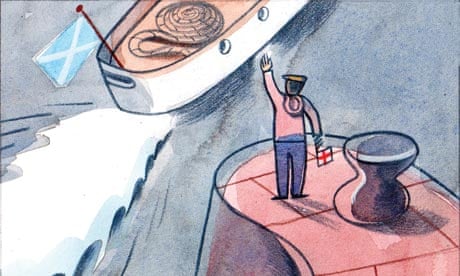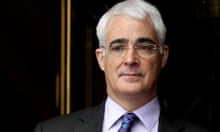Here we go again. Ireland gone. Scotland going. Next is Wales, and then where? Cornwall? The Isle of Wight? There is no knowing what the ineptitude of London politics may do to the British confederacy. The latest row over yes or no to Scottish "independence" is mere play-acting. The real issue is option three, "devo max". London hates it. Scotland craves it.
For the past week constitutionalists have been dragged from their cobwebs to pore over laws and documents. This is pointless. When dissident provinces are set on separatism, the minutiae of referendum law will not stop them. Look at Bosnia, Slovakia, Kosovo, Macedonia – each different but starting from the same source. Britain went to war to break up the Yugoslav union. Many Britons yearn for the break-up of the European one. Why do they fight to sustain the United Kingdom as it manifestly crumbles?
The answer is that English tribalism trumps hypocrisy. David Cameron has only conceded a binding referendum on Scottish independence because polls say it will be rejected. He opposes any delay because that makes such an outcome less certain. The nationalist, Alex Salmond, thinks the opposite – and for the same reason. Neither wants to risk defeat. Thank goodness elections at least are ordained by law.
The longer London derides the aspirations of the non-English peoples of the British Isles, the stronger those aspirations will grow. Ireland departed the union in exasperation at London misgovernment in 1922. Only last year could the Irish tolerate a day visit by the Queen. Resistance to devolution cost James Callaghan his majority in 1979 and decimated Labour support in Wales. The imposition of a poll tax on the Scots in 1989 contributed to Margaret Thatcher's downfall and all but wiped out Scottish Toryism.
Today, Cameron on Scotland is like George III on America, "astonished at the rebellious disposition which unhappily exists in some of my colonies".
Most baffling of all is Cameron's horror of devo max, the one measure that might mitigate the UK's current centrifugalism. While the details remain to be discussed – first steps were set out in the 2009 Calman report – the concept is simple, that the Scots should raise and spend their own taxes and end their fiscal relationship (or most of it) with London. Monarchs, soldiers, flags, borders, passports are not at issue. Devolution would extend to paying for the infrastructure of the welfare state. Scottish – and eventually Welsh and Ulster – governments would be directly answerable for domestic policy to their electorates.
If the Scots want this, and polls suggest they do, what does it matter that it would "cost them billions", as the British media constantly crows? Denmark survives. Norway survives. Meanwhile the Scots, Welsh and Ulster economies are more akin to that of Greece, with spending decisions detached from taxing ones to the point of irresponsible dependency. Scotland gobbles English money and nationalist politicians win votes by spending it on student grants, health prescriptions and wind turbines. Oil is not the issue, since a wasting asset should not go on current expenditure.
There is no English advantage in letting this dependency continue, and it stands to the credit of Scots majority opinion that it wants it to end. Maximum devolution would repatriate fiscal responsibility to Adam Smith's home country. It would bring down to earth the spendthrift populism of Salmond's nationalists, probably lose them the next election and damage the cause of full independence. It would also demand a drop in the number of Scottish MPs at Westminster. All this is to the advantage of Cameron's Tories.
The same goes for Wales. It is not Edinburgh (where Welsh was once spoken). Its decade-long experience of devolution has been politically fractious. Hospital and school closures are shambolic, economic development is dire and local democracy has been reduced to jobs for the boys. Welsh nationalists want independence, yet they also want more subsidy and disproportionately high representation at Westminter.
Even so, a return to Welsh direct rule from Whitehall is inconceivable. There has been a steady rise in devolutionary enthusiasm, from the hesitancy of 1999 to two thirds support in a referendum last year. Rudeness about Celts may be a political parlour game in London, sometimes justified. But the idea that it makes Celts more inclined to bend the knee to Whitehall is absurd. They may not be Kurds or Kosovans, but they have much in common with Basques, Bretons and Catalans. Why not treat them as such?
The United Kingdom was a creation not of tribal identity but of opportunism and convenience. Its dissolution began in the 1920s and has not ended. There is no historical necessity to it, any more than there was to the Third Reich or the Soviet Union, or now to the EU. Confederations have to be updated and nurtured to survive. Sometimes they outlive their purpose.
Cameron should let Salmond have his referendum, and indeed champion devo max. It promotes fiscal responsibility. It would end the costly subvention to Scotland. Its political realism might even revive Tory fortunes in Scotland. Why Cameron should oppose it "to the last drop of my blood" is puzzling.
There can be only one answer. Power and the craving for central control take on a logic of their own when politicians attain high office. In this case the craving is counterproductive. A century ago the British Isles were one nation. The government seems set on making it four.
Twitter: @simonjenkins4







